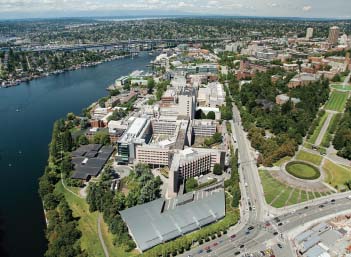This is unpublished
History
Beginning in 1957, shortly after the UW School of Medicine and Department of Medicine were founded, the residency program began with 24 positions and residents completing all of their training at one site, Harborview Medical Center. We’ve grown quite a bit since then! In 2025-26 have 185 residents, including 13 chief residents, and rotations at over 20 medical centers, affiliates, and clinics.
MISSION
We graduate residents who are fully prepared to thrive and serve the community in the next chapter of their careers.
Purpose
We prepare medicine residents to care for individuals and the community.
CORE VALUES
- Integrity
- Excellence
- Curiosity
- Compassion
- Community
EDUCATIONAL PHILOSOPHY
- Develop an educationally motivated curriculum, not a service-based curriculum
- Provide broad-based foundational training during the R1 year
- Focus on a core curriculum for senior residents, the essentials for all IM residents regardless of career path, with a graduated increase in patient care autonomy, leadership, and teaching
- Allow for greater individualization of training based on a resident's career goals through:
- Elective time
- Learning pathways
- Mentorship (RAMP; Residency Advising and Mentoring Program)
PROGRAM AIMS
| VALUES HIGHLIGHTED | OUR PROGRAM AIMS TO: |
|---|---|
| Superb clinical training | To improve the health of the public by training superb clinicians who are leaders in academic medicine, community practice, public health, and healthcare policy and administration utilizing an individualized curriculum in a supportive and caring environment. |
| Diversity | Recruit residents with diverse backgrounds and experiences, reflecting the patients we serve. |
| Inclusion, wellness, humanism | Create an inclusive, supportive, engaged, and healthy community centered on our core values and that embraces our shared humanity. |
| Intentionality, unparalleled range of opportunities | Provide a competency-based, intentional curriculum across an unparalleled range of clinical and non-clinical training opportunities driven by the varied educational needs and career interests of our residents. |
| Individualized training | Support resident career development through individualized training. personalized mentorship and robust, differentiated opportunities for leaning and scholarship. |
| Leadership | Cultivate graduated increases in patient care autonomy leadership, and teaching across all learning environments to prepare our graduates for roles as leaders in medicine. |
| Community, advocacy | Engage with the communities we support through service and advocacy. |



